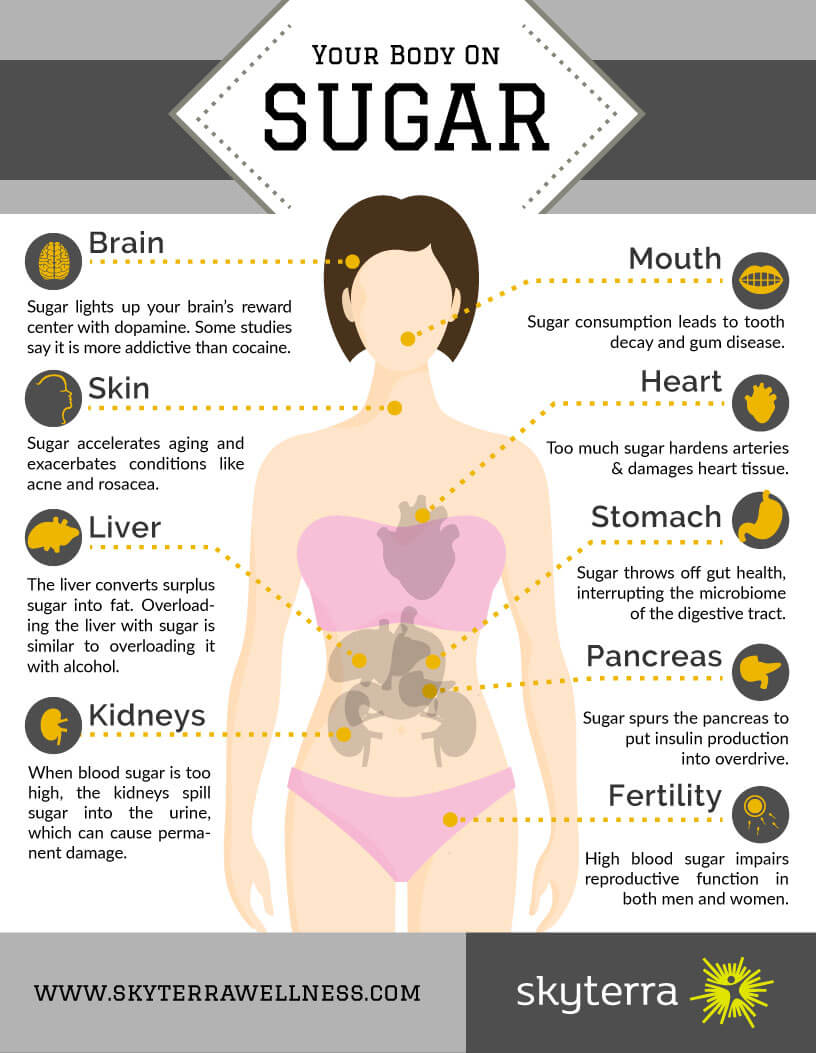Bottom Line Up Front (BLUF): Drink more water & eat only what your body needs.
Ok folks, let's chat about S-U-G-A-R. It's a complex topic! Forgive the Dad joke, this is no laughing matter.
There are dozens of types of sugars, too many for many to process; both physically & mentally. So let's break it down! (sorry, more Dad jokes)
Our bodies release acids & enzymes in the stomach to process what we eat & drink. Digesting converts the carbohydrates (sugars & starches) into glucose.
The stomach & small intestines process glucose & release it into our blood. Once in the bloodstream, glucose can be used immediately for energy or stored for later.
Pause for a moment, here, to think about how you shop for groceries. Ask yourself, "Am I shopping like a doomsday prepper, or am I shopping for what I need this week?" If you lean more towards the prepper, then you are likely eating food that is full of stuff to preserve it until the zombie apocalypse (or the next Covid lockdown). In contrast, if you're eating more fresh fruits & veggies, your body will treat it the same & process it more rapidly. In many cases, there's very little need for long-term storage.
Insulin is the chemical created by the Pancreas as a sort of gate-keeper, regulating whether to use or store glucose. Without insulin, glucose stays in the bloodstream & raises blood sugar levels. Proper levels of insulin unlock our cellular "doors" to let in glucose that give us energy. More & more complex food (i.e. food processed with preservatives) require more gatekeepers - more insulin.
If you eat a large meal & you're not a gladiator or slaying dragons, your body doesn't need much glucose right away. So, insulin helps your body store it the pantry of our bodies, as fat & protein; a.k.a. fat cells.
Back to your shopping, "non-perishable foods" are chemically engineered to last, and meant to be stored. Think about that as you shop & as you decide what to put in your body.
We all need protein to work & grow. The body needs fat & proteins to build muscle, protect nerves & to balance hormones. That is largely based on our activity levels, but there's growing evidence suggesting it's related to our DNA and maybe even our blood types. Every body is different, but we're also human organisms. The specific range & balance are different, but the concepts are relatable to us all.
For example, individuals with diabetes struggle to regulate glucose, because the body has stopped making insulin, has slowed down the amount of insulin it's making, or is no longer able to use its own insulin very well. Without the gate-keeper, the cell doors are locked or the wrong doors are unlocked - glucose doesn't enter the cells where it's needed.

Does this make your mouth water? If so, stop to consider what unconscious signals your brain is sending to your body.
Right now, the United States (and Indiana, in particular) is leading an epidemic in the obesity crisis. Sugar is causing some major issues with our health. The Hoosier state hosts more than 5 fast food restaurant per individual.
Experts advise drinking 6-8 glasses of water every day for oxygen to flow freely in our bodies & help flush the waste; literally. That includes helping us flush excess sugar. Add at least 24-48 ounces if you're doing exercise that makes you sweat for at least an hour. (Sweat is another way our body releases waste - uric acid.)
Our human bodies are incredibly complex organisms. Much has been learned, and yet still remains to be learned about our bodies, including the connection between our brains & our bowels.
At great risk of over-simplification, we want to highlight the risks of the food & drinks we consume. Know what's in the food you eat. Form follows function, so eat to live, don't live to eat.
The subject seems worth a pause for self-reflection. Interested in a good litmus test for how your body processes food & drinks? Think about what you can eat or drink during a hot yoga class. What about 1 or 2 hours before a class? And, after hot yoga, what does your body crave the most? Are the answers different for Hatha, Vinyasa, or Yin?
Shift from thinking to feeling. Our bodies know what we need to heal. The practice is to create the space, and the stillness to listen.
We hope you are able to make the types of choices that will enable a long & healthy practice. We're saving a spot for you & your mat. Join us for our next class today!

